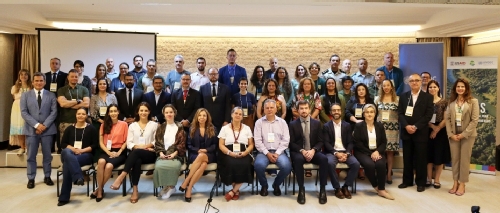UNODC and Ministry of Environment carry out participatory diagnosis on response to wildlife crime in Brazil
 |
Brasilia, 22 November 2023 - The United Nations Office on Drugs and Crime (UNODC) and the Brazilian Ministry of Environment and Climate Change, through the National Secretariat for Biodiversity, Forests and Animal Rights (SBio/MMA), promoted a national self-assessment exercise on Brazil's response to wildlife crime on 21 and 22 November in Brasilia-DF.
The Indicator Framework exercise is a tool developed by the International Consortium to Combat Wildlife Crime (ICCWC), a collaborative effort of five intergovernmental organisations: UNODC; the Secretariat of the Convention on International Trade in Endangered Species of Wild Fauna and Flora - CITES; the International Criminal Police Organisation - INTERPOL; the World Bank; and the World Customs Organisation - WCO. This tool has been designed to draw up a diagnosis, identify priorities and establish a framework for monitoring progress in tackling these crimes.
Held as part of UNODC Brazil's ECOS - Regional Cooperation to Combat Environmental Crimes project, the exercise was supported by the United States Agency for International Development (USAID) and the National Programme for the Conservation of Endangered Species (Pro-Species).
Over the course of two days of activities, around 50 justice operators, law enforcement state and federal officials, public managers and experts discussed issues related to national legislation and law enforcement concerning crimes against wildlife. The participants have analysed the capacities of institutions to conduct specialised investigations, the use of criminal intelligence information, inter-institutional cooperation, the training and availability of human resources, border control, information management, the scope of national legislation and the capacity to prosecute and convict in wildlife crime cases.
The evaluation of the Framework of Indicators has been carried out by the national entities themselves, in a participatory and dialogued voting process. As well as representatives from the MMA, participants included the Brazilian Institute for the Environment and Renewable Natural Resources (IBAMA), the Chico Mendes Institute for Biodiversity Conservation (ICMBio), the Federal Police (PF), the Federal Revenue Service (RFB), the Ministry of Justice and Public Security (MJSP), the Brazilian Army, the Public Prosecutor's Office, the Judiciary, security and environmental secretariats from all five regions of the country, postal agencies, as well as civil society, international organisations and academia.

At the opening of the event, Elena Abbati, UNODC Brazil director, reinforced the Office's commitment to actively contribute to enhancing public policies based on an inter-institutional and integrated approach, strengthening the fight against crimes that affect the environment. "The Framework of Indicators is an important tool for the country to know the situation of the response to environmental crimes in an objective way, based on evidence and referenced in parameters," she emphasised.
The National Secretary for Biodiversity, Forests and Animal Rights, Rita de Cássia Guimarães Mesquita, emphasised the actions for the conservation of Brazilian fauna and the contribution of the Framework of Indicators to these efforts. "It doesn't matter how much we invest, as a country, in seeking to recover populations of threatened plants and animals - as long as crime is operating in society, we won't succeed. Building intelligence on this issue is fundamental," she said.
The results obtained during the exercise will be analysed and systematised in a recommendations report containing priority needs, action points and possibilities for cooperation between UNODC, MMA and other institutions working on the issue.
Learn more about the Framework of Indicators
The Indicator Framework is an ICCWC analytical tool for assessing the preventive, criminal justice system and law enforcement responses to crimes against wildlife and forests.
The instrument provides a standardised framework for assessing and monitoring capacities, listing the expected results of effective law enforcement and detailing these results in 50 indicators that are measured through a self-assessment exercise.
In Brazil, during the preparation for the exercise, it was decided to focus the assessment on wildlife offences, as there are complementary initiatives already underway for forestry offences.
UNODC and environmental crimes
As the guardian of the UN Convention against Transnational Organised Crime (Palermo Convention/UNTOC), UNODC works in partnership with federal and state institutions as well as provides technical assistance to strengthen the response to crimes affecting the environment. UNODC's approach also takes into account the convergence of these practices with transnational organised crime and other associated crimes, contributing to achieving the Sustainable Development Goals, with a focus on SDG 15 “Life on Land” and SDG 16 “Peace, Justice and Strong Institutions”.
To find out more about UNODC's work on crimes affecting the environment, visit here, and for UNODC publications on the subject, visit here.
Aprenda mais: http://www.agenda2030.com.br/